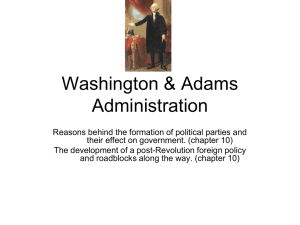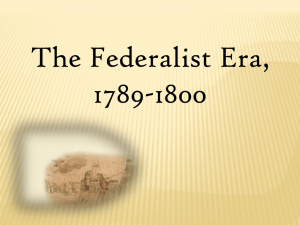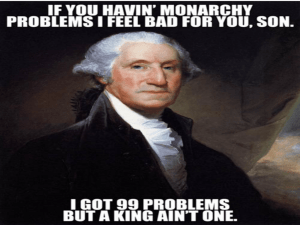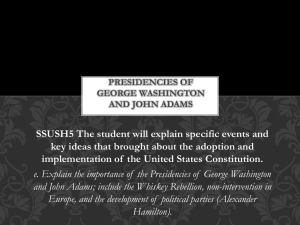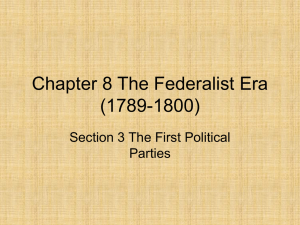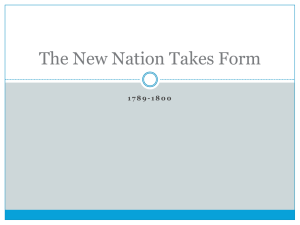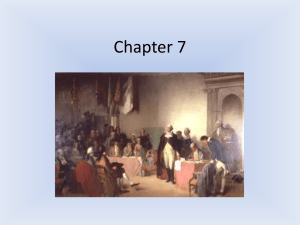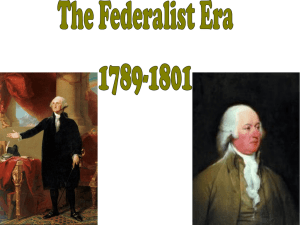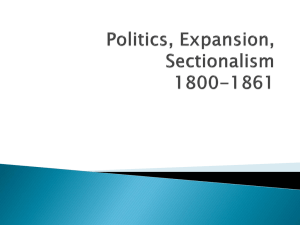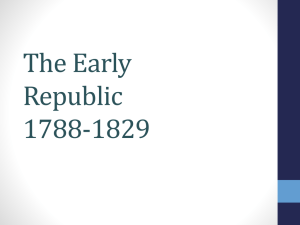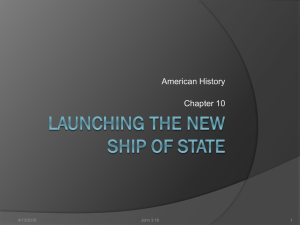The Federalist Era
advertisement
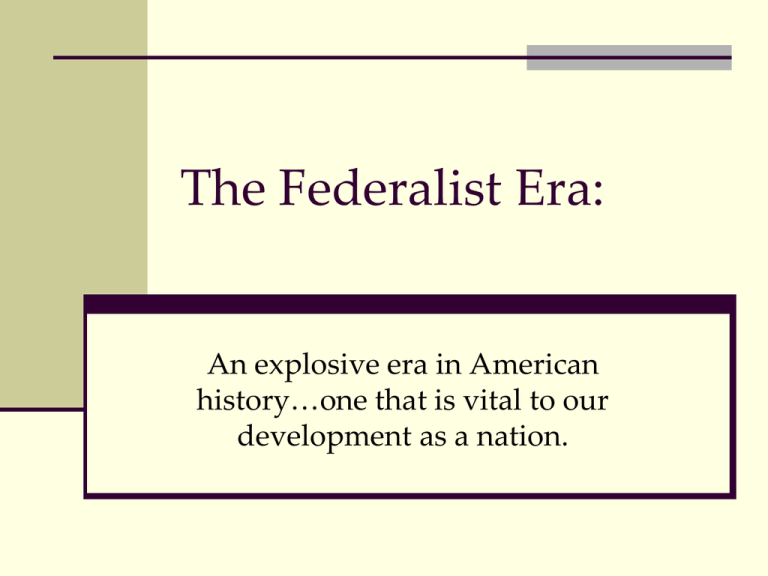
The Federalist Era: An explosive era in American history…one that is vital to our development as a nation. Washington assumes control 4/30/1789 An exercise in simplicity “Ocean of difficulties” Washington is about the “safest” maybe not the best (although you could make a case for that) president we have ever had. We knew exactly what we were getting Tasks facing Washington Create Bureaucracy: the misunderstood branch of Government…is it a branch, lacks a check/balance relationship? Judiciary Raise $$$$$ Bill of Rights issue Start governance for this nation Steady foreign relations SECTION 1 Washington Heads the New Government The New Government Takes Shape Judiciary Act of 1789 • Judiciary Act of 1789 creates Supreme, 3 circuit, 13 district courts • State court decisions may be appealed to federal courts Washington Shapes the Executive Branch • Washington elected first president of U.S. in 1789 - executive branch is president, vice president • Congress creates State, War, Treasury Departments • Alexander Hamilton becomes secretary of treasury • Washington adds attorney general; these Department heads are Cabinet Image NEXT SECTION 1 Hamilton and Jefferson Debate Hamilton and Jefferson in Conflict Chart • Hamilton: strong central government led by wealthy, educated • Jefferson: strong state, local government; people’s participation • Hamilton has Northern support; Jefferson has Southern, Western Hamilton’s Economic Plan • U.S. owes millions to foreign countries, private citizens • Plan—pay foreign debt, issue new bonds, assume states’ debt • Some Southern states have paid debts, against taxes to pay for North Continued . . . NEXT Cabinet Government Problem of National Debt Hopefully we learned from the problems caused by Shay’s Rebellion? 1790 estimates Paying soldiers…revolution possible “the price of liberty” Hamilton: the Economic whiz kid…an important maligned figure in US History Philosophies of Hamilton: 1st Conservative Debt Assumption: Demonstrates the supremacy of the National Government Laid ground work for Civil War? Establishment of a National Bank? SECTION 1 continued Hamilton and Jefferson Debate Plan for a National Bank • Hamilton proposes Bank of the United States: - funded by government, private investors - issue paper money, handle taxes • Disagreement over Congressional authority to establish bank • Debate begins over strict and loose interpretation of Constitution The District of Columbia • To win Southern support for his debt plan, Hamilton suggests: - moving nation’s capital from NYC to South • Washington, D.C. planned on grand scale; government seat by 1800 NEXT The National Bank Will serve to add to the problems of sectionalism and will be an issue for the next 100 years! Case for a national bank: series of papers authored by Hamilton…summary Currency Investment Upper class Government finance and taxes Heated controversy over the Bank? Problem…will become the foundation for modern politics! Construction of the constitution Political language, political interpretation and a reading of the Constitution. Whiskey Rebellion The first true “test” of the Constitutions power and authority. What, and Why? SECTION 1 continued The First Political Parties and Rebellion The Whiskey Rebellion • Protective tariff— import tax on goods produced overseas • Excise tax charged on product’s manufacture, sale, or distribution • In 1794, Pennsylvania farmers refuse to pay excise tax on whiskey - beat up federal marshals, threaten secession • Federal government shows it can enforce laws by sending in militia NEXT The Foundation of Modern Politics: The Political Party Birth: arising from the difference of opinion between Jefferson and Hamilton Jeffersonians: Republicans (modern Democrats) Hamiltonians: Federalists (modern Republicans) Role of Newspapers SECTION 1 The First Political Parties and Rebellion Federalists and Democratic-Republicans • Split in Washington’s cabinet leads to first U.S. political parties: - Jefferson’s allies: Democratic-Republicans - Hamilton’s allies: Federalists • Two-party system established as two major parties compete for power Continued . . . NEXT Conflicting Views Two individuals: two stark differences (page 215) Hamilton: Elitist Strong Central Gov’t Balanced economy with National Bank Ally of Britain Model our nation after Britain Jefferson Common man Distrusted privilege Weak central government Democratic gov’t Agrarian economy Support France Their Biggest Difference between the two men? Construction of the Constitution How should the constitution be interpreted? Jefferson a strict constructionist: reason being…the best way to check the level of power of the large government Hamilton a loose constructionist: reason being…the best way to enhance the level of governmental power. Washington’s worst fear realized One of the flaws in Washington’s armor. Washington and “King”… A fierce advocate of Democracy…yet? Fear of factions Benefits of Factions Political Developments Aside: Foreign Policy takes center stage. French…what to do? Native Americans Problem? Revolution: Why do we feel the need for loyalty? A Tale of Two Pictures? The main difference? Pursuit of goal, liberty? Internal v. External destruction? Probability of Success? Why we didn’t totally involve ourselves with France? Problems with their revolutionary aims and strategy. Problems over land disputes here in colonies Rise of political factionism, political parties and the dispute between Jefferson and Hamilton The idiocy of Edmond “citizen” Genet…and his privateer approach in Florida. A clue: don’t irritate George Washington. Pinckney’s Treaty Agreed upon with Spain Set the boundary of the US at the 31st parallel US gains Mississippi. (HUGE) Britain tests US neutrality and authority. The aforementioned problems along with those presented by the British…have illustrated the first “challenge” to the United States from a diplomatic perspective. Britain and neutrality? Why is our role so important…an explanation. John Jay the Great Diplomat His mission in Britain…simple-stop the seizure of American Vessels. His secondary mission…secure neutral alliances if mission 1 fails! Jay’s Treaty No agreement to stop “Damn John Jay, Damn seizing ships No agreement to leave the Ohio Valley (agreed to extend window by 18 months) US had to repay British debts Ummm… any man who won’t damn John Jay, Damn any man who won’t stay up all night damning John Jay.” Popular song of the day “I imagine I could find my way home (NY) by following the fires of burning effigies” Jay Problems with Indians Vacuous western lands confusing in two regards…who runs them from our perspective and what about the Indians? Remember the Iroqouis (4/6 of the groups) sided with the British during the Revolution and were obviously not in the best situation since our victory. The time saw a rise in raids on frontier areas and families Indian Actions? Scalping and home destruction were common There destructive murderous raids became a major problem for the new nation. Response? Our response was unkind to the Indians and marks the beginning of our dramatic mistreatment and relocation movements of American Indians in the new national phase. Indians will be forced to sell Ohio and much of Illinois for a mere 10,000 annually! Harmar’s Defeat and “Mad” Anthony Wayne Stunning defeat-Harmar; Victory for Wayne whose name conjurs up images of heroism in US History. Treaty of Greenville The tribes agreed to surrender their claims to lands in the southeastern portion of the Northwest Territory (mostly present-day southern and eastern Ohio) The tribes also gave up additional defined areas that were used by the whites as portages and fort locations. This category included Fort Detroit and the site of the future town of Chicago on Lake Michigan The United States government agreed to make an immediate payment of to $20,000 in goods to the tribes, as well as annual payments of $9,500 in goods to be divided among specified tribes The tribes retained the right to hunt throughout the area. The End of the Washington Era Refused to serve a third term as President…established a trend. Urged us in his notable Farewell Address to avoid Alliances and Factions and threatened that both could tear apart the “Fragile” nation. The next question becomes…Who succeeds the President? Well…that didn’t last long As soon as Washington and his term ended, the partisan war over who was to replace him began. Federalist assumed…you know what is to assume that John Adams the VP founding father was the logical selection. Problem here…who to nominate for VP Hamilton-the talented choice but people distrusted him for anything other than a cabinet position. Selection for VP candidate by Federalists: the controllable popular Thomas Pinckney Federalist ticket for 1796 Republican strategy A key opportunity: they feared that the country after the success of Washington who most considered a Federalist…would lead to a monarchy of sorts for the Federalists. So they nominated their most popular Candidate available to them and that was Thomas Jefferson. Results: a political catastrophe! Order of finish: Adams-71 Jefferson-68 Followed by Pinckney, and Aaron Burr A political calamity…the Constitution called for candidates 1, 2 to finish Pres. And then VP. However, the Constitution did not account for the partisan nature of the new system. So we have a federalist president, and republican VP. Presidency of Adams Characteristics Good intentioned Not very talented Poor judge of character An average President XYZ AFFAIR Continuation of problems with France Outraged by Jay’s treaty French began siezing US vessels Negotiation team sent to avoid war Bribery and deception Issue now becomes…do we go to war or not Adams was able to secure peace without having to go to war but is was still a hated act? Adams and Washington…problem: Both refused to accept themselves as “political beings”…viewed themselves above Partisan politics. This is not possible. Adams was our first president to be criticized…and he got it bad from the Republicans. Adams takes it to the extreme! Alien and Sedition Acts Alien and Sedition Acts • • Under the threat of war with France, Congress in 1798 passed four laws in an effort to strengthen the Federal government. Known collectively as the Alien and Sedition Acts, the legislation sponsored by the Federalists was also intended to quell any political opposition from the Republicans, led by Thomas Jefferson. A series of Four Acts Four Acts: • • The first of the laws was the Naturalization Act, passed by Congress on June 18. This act required that aliens be residents for 14 years instead of 5 years before they became eligible for U.S. citizenship. Congress then passed the Alien Act on June 25, authorizing the President to deport aliens "dangerous to the peace and safety of the United States" during peacetime. • • The third law, the Alien Enemies Act, was enacted by Congress on July 6. This act allowed the wartime arrest, imprisonment and deportation of any alien subject to an enemy power. The last of the laws, the Sedition Act, passed on July 14 declared that any treasonable activity, including the publication of "any false, scandalous and malicious writing," was a high misdemeanor, punishable by fine and imprisonment. By virtue of this legislation twentyfive men, most of them editors of Republican newspapers, were arrested and their newspapers forced to shut down. The effected! • • One of the men arrested was Benjamin Franklin's grandson, Benjamin Franklin Bache, editor of the Philadelphia DemocratRepublican Aurora. Charged with libeling President Adams, Bache's arrest erupted in a public outcry against all of the Alien and Sedition Acts The arrest of Franklin-Bache caused a public outrage that threatened the legitimacy of our Constitution and the presidency of Adams Impacts of the Alien and Sedition Acts: Set the US on a very dangerous political course! Threatened the future of American Party Politics and it’s greatest gift: DISCOURSE Further enhanced the bubbling sectional conflict that has been brewing since pre revolutionary days…why? Let’s look at this again: The Virginia and Kentucky Resolutions: Led by our two main Democratic Republican forefathers: Madison and Jefferson. A movement in southern legislatures that denounced the acts as unconstitutional and their role as parties to the constitution gave them the power to nullify…exercise their rights of social contract! James Madison Further impact The acts encouraged other states to follow their lead and declare the acts of congress null and void however fortunately none did so…with the weakness of our court system at this time this could have torn apart the country. A second harbinger to events of the civil war…why? Election of 1800: A very modern election for 1800! Adams: “those who Jefferson a defender of own the country ought to govern it!” Elitist, violator of civil rights. An ally of Britain liberty A heretic in the eyes of federalists An unpopular ally of France Results and Worry? Worry: The sectional partisan election was so hotly contested the fear was that it could serve to tear the country apart! Result: Jefferson-73 Adams-65 Only problem-Burr the VP candidate for Jefferson also got 73 votes! Federalist congress has to break tie between Republicans! An unlikely result Jefferson: saved by the unlikely contribution of his hated adversary: Alexander Hamilton! Why: he hated Burr more!
